By Tristen Coffee
As a current intern at Prosper Waco, I can speak to the power of internships. The opportunity to get hands-on experience in a field that interests you is valuable for personal and professional development, and also helps when it comes to getting hired for that first job. A job candidate with pertinent internship experience automatically has at least a little bit of an advantage during a job interview compared to someone with no experience at all.
One of the community goals that the Prosper Waco initiative was created to support is to Increase youth employment. One strategy for making progress on that goal is to help young people get job experience through high school internships.
The Prosper Waco backbone organization and Waco ISD have worked together since 2016 to build and grow a summer internship program that pairs rising seniors with local employers to create paid internships in an industry relevant to each student’s specific career academy. This program has proven to be beneficial to students and employers alike, and will continue to develop as students from other McLennan County school districts start to participate. (To learn more about summer internships and the other education-related initiatives that Prosper Waco is helping to support, visit this webpage: https://prosperwaco.org/the-work/initiatives-and-projects/.)
Student internships are great opportunities for the individual students who participate, and they are also a part of a larger strategy of talent development for our region.
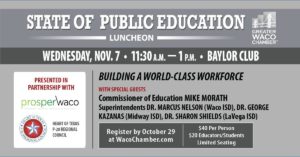 On Wednesday, November 7, Prosper Waco, the Greater Waco Chamber of Commerce and the Heart of Texas P-20 Regional Council are hosting a luncheon to share information about the current state of public education in Texas. Texas Commissioner of Education Mike Morath will give an update on the progress that has been made and the challenges we still face in regard to public education today. Local experts will provide regional data on student achievement as well as information about how area schools are working to solve problems and prepare their students for the future.
On Wednesday, November 7, Prosper Waco, the Greater Waco Chamber of Commerce and the Heart of Texas P-20 Regional Council are hosting a luncheon to share information about the current state of public education in Texas. Texas Commissioner of Education Mike Morath will give an update on the progress that has been made and the challenges we still face in regard to public education today. Local experts will provide regional data on student achievement as well as information about how area schools are working to solve problems and prepare their students for the future.
In addition to the keynote speaker, the luncheon will feature a panel of superintendents: Dr. Marcus Nelson of Waco ISD, Dr. George Kazanas of Midway ISD and Dr. Sharon Shields of La Vega ISD. Dr. Phil Rhodes will also present local workforce pipeline data, encompassing college and career readiness. This will give the community a good chance to get an insider look at how our local school districts are working to make sure young people growing up in the greater Waco area can provide the workforce we need for the coming decades.
The opportunities for businesses to work with schools in a mutually-beneficial manner will be a major theme of the event. This could look like businesses providing internships or job-shadowing opportunities, providing mentors for students, taking part in Advisory Boards, etc. The higher the quality education provided in the Waco area, the better our workforce will be down the road. Businesses typically have the resources, and high school students typically have the willingness to learn from practical experience. The collaboration between businesses and education is a win for everyone.
This event will be held at the Baylor Club (1001 S MLK Blvd). Doors open at 10:30 a.m. for networking and a “School Spotlight,” and the luncheon itself will kickoff at 11:30. This event will not only provide clarity on where we are with public education today, but will also spark conversations about how we can build a world-class workforce and ultimately strengthen our economy. On behalf of the P-20 Council, the Chamber and Prosper Waco, we hope to see you there!
 Tristen Coffee is a senior Journalism/Public Relations major with a concentration in Marketing at Baylor University. She is currently the PR/Communications intern at Prosper Waco. Originally from Temple, TX right down I-35, Tristen has loved calling Waco home for the past going-on-four years and is excited (but not quite ready) to see where life takes her after graduation in May.
Tristen Coffee is a senior Journalism/Public Relations major with a concentration in Marketing at Baylor University. She is currently the PR/Communications intern at Prosper Waco. Originally from Temple, TX right down I-35, Tristen has loved calling Waco home for the past going-on-four years and is excited (but not quite ready) to see where life takes her after graduation in May.
The Act Locally Waco blog publishes posts with a connection to these aspirations for Waco. If you are interested in writing for the Act Locally Waco Blog, please email [email protected] for more information.
According to the Prosper Waco website, one of our goals in the community of Waco is to “Increase youth employment.” In my job as Workforce Coordinator at Communities In Schools (CIS) that goal is in the front of my mind every day. When asked about writing a success story about our Workforce program, it was hard for me to pick! There are countless successful youth that I could highlight in an article. I could point to many of our clients who have challenged themselves to overcome their barriers and have worked tirelessly to be victorious in education and employment. For example, the young person I will profile in this post balanced a multitude of responsibilities and has been extremely successful in her educational and employment journey.
 Selena Hernandez originally started in the Communities in Schools program at La Vega High School. After high school graduation, she was referred to the Workforce Development (WIOA) program as she had a strong interest in obtaining her nursing degree. After attending MCC for her prerequisite courses and meeting the rigorous nursing school requirements, she was accepted into the Registered Nursing Program at MCC. Selena was able to maintain her responsibilities as a mother, keep up her grades and work overnights at Providence Hospital Emergency Room in Patient Registration. While on her journey to become a nurse, Ms. Hernandez ran into some educational challenges but with the help of Communities in Schools and her own self-determination she was able to push through.
Selena Hernandez originally started in the Communities in Schools program at La Vega High School. After high school graduation, she was referred to the Workforce Development (WIOA) program as she had a strong interest in obtaining her nursing degree. After attending MCC for her prerequisite courses and meeting the rigorous nursing school requirements, she was accepted into the Registered Nursing Program at MCC. Selena was able to maintain her responsibilities as a mother, keep up her grades and work overnights at Providence Hospital Emergency Room in Patient Registration. While on her journey to become a nurse, Ms. Hernandez ran into some educational challenges but with the help of Communities in Schools and her own self-determination she was able to push through.
There were many times she would visit the office and have her children with her. They would play and we would work on job readiness activities and talk about her aspirations and struggles. She is the definition of a multi-tasker! Ms. Hernandez received her Licensed Vocational Nurse (LVN) credentials in Summer 2017 and completed the RN Program in December 2017. She dedicated her time to her family and her studies and became a licensed RN in 2018.
Selena is now employed at Quality Care Nursing Facility as a Nurse Supervisor and works PRN (as needed) at the Atrium Nursing Facility as a Registered Nurse.
She was able to attend her classes and clinicals, meanwhile balancing employment and her responsibilities as a wife, mother, and daughter! She is a true rock star. To know Selena is to know an outgoing and compassionate heart. She shows such amazing compassion for her family, patients, and those around her. She has a positive outlook on life and she is certain to make you laugh with her humorous personality. When you look at Selena’s journey you will find that the path to success is paved with dedication, time, and finding a way to move past setbacks. She has taught us that if you have a passion, you should follow it with every twist and turn!
The Workforce Development Program at Communities In Schools provides career coaching to youth ages 16-24, both in and out of school, to assist them in educational attainment and reaching their post-secondary goals. The Workforce Development program provides academic assistance, GED preparation, career exploration, assistance with entry into post-secondary education, and job placement opportunities. For more information, please visit www.cishot.org or email [email protected] today!
The Act Locally Waco blog publishes posts with a connection to these aspirations for Waco. If you are interested in writing for the Act Locally Waco Blog, please email [email protected] for more information.
By Christina Helmick
As you may have heard, the US Census Bureau recently released the 2017 American Community Survey (ACS) data. The ACS is an ongoing survey of individuals and households. The government uses this information to help distribute federal and state funds each year, and the Prosper Waco backbone organization uses this data to track our community’s progress toward the initiative goals. The ACS includes information about population demographics, employment, income, educational attainment, housing and other topics. It is important to note that while the newly released ACS data breaks down 2017 outcomes, it is the most available and recent data for our community to use in guiding the work of Prosper Waco. Click here to peruse the American Community Survey data portal.
Across all indicators, Waco saw notable improvements from 2016 to 2017. Waco’s growth mirrored the growth that was seen at both the state and national levels. Below is a breakdown of key indicators of how our community is doing:
Poverty rates:
In 2017, the number of individuals experiencing poverty was concentrated within the City of Waco. The number of children (individuals under the age of 18) living in poverty in Waco increased, while all the other categories decreased.
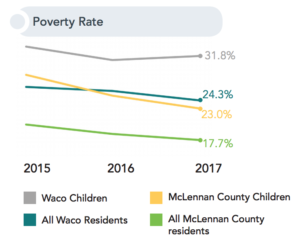
Median Household Income:
The 2017 numbers for the City of Waco and McLennan County followed state and national trends of increased median household income. In 2017, the median household income in Waco was $8,204 less than for the rest of McLennan County.
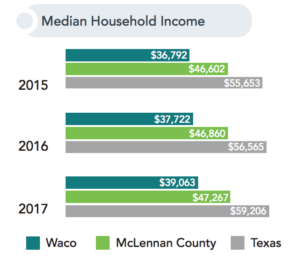
Educational Attainment:
McLennan County and Texas had similar educational attainment rates in 2017. Waco, McLennan County and Texas followed similar trends, which indicated that the general population is becoming more educated. In 2017, one in eight residents of Waco had a high school diploma, compared to one in four in both the county and state.

Unemployment:
In 2017, one in six youth who looked for work were unable to find employment. Waco had slightly higher unemployment rates compared to the county and state.
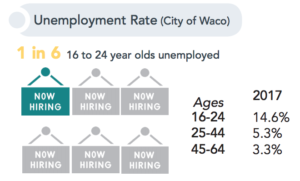
Health Insurance:
Eighty-five percent of Wacoans were insured in 2017, which was higher than the state average. Additionally, the highest population at local, state and national levels without health insurance were 26-34 year olds.
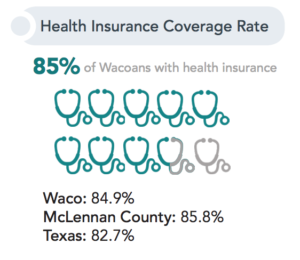
Our community is using data, like what is highlighted above, to make data-informed decisions and to work toward advancing the goals of the Prosper Waco initiative. To learn more about these partnerships and initiatives, visit “The Work” page on the Prosper Waco website.
If you have any questions or comments, email [email protected] or call 254-741-0081.

 Christina Helmick is the director of communication at Prosper Waco. She is a recent graduate of Baylor University with a BA in Journalism, Public Relations & New Media. Originally she is from Washington, D.C., but has stayed in Waco post-graduation. She is an active mentor at J.H. Hines Elementary School, enjoys spending time with her family and watching Baylor football. Sic ’em Bears!
Christina Helmick is the director of communication at Prosper Waco. She is a recent graduate of Baylor University with a BA in Journalism, Public Relations & New Media. Originally she is from Washington, D.C., but has stayed in Waco post-graduation. She is an active mentor at J.H. Hines Elementary School, enjoys spending time with her family and watching Baylor football. Sic ’em Bears!
The Act Locally Waco blog publishes posts with a connection to these aspirations for Waco. If you are interested in writing for the Act Locally Waco Blog, please email [email protected] for more information.
By Wendy Cox
If you’ve paid attention to the news over the last 10 years, you’ve likely heard debate around our nation’s healthcare system. In many respects it seems Americans really have a “sick care” system instead.
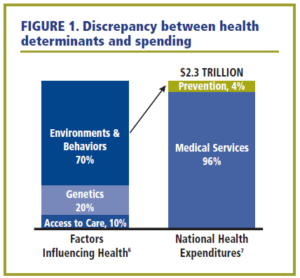
Figure 1. Discrepancy between health determinants and spending. Adapted from “Community Centered Health Homes: Bridging the gap between health services and community prevention,” by J. Cantor, L. Cohen, L. Mikkelsen, R. Panares, J. Srikantharajah, and E. Valdovinos, 2011, p. 4. Copyright 2011 by Prevention Institute.
We visit our clinics most often when we are already sick, and physicians are paid almost exclusively for treating sick patients. This model is financially burdensome (Figure 1). Environments and behavior, which can be changed, are at the root of most illness, and yet only 4% of our $2.3 trillion-dollar healthcare budget is spent to promote health and prevent illness. According to the Centers for Disease Control, chronic conditions like heart disease, diabetes, and obesity affect half of Americans and account for 75% of healthcare spending. Because chronic conditions are preventable with lifestyle and environmental changes around risk factors like diet and physical activity, our current models of care and funding don’t make financial sense. More money should be invested in creating healthy environments that lead to healthy behaviors.
With generous support from the Episcopal Health Foundation’s Community Centered Health Home (CCHH) grant, Family Health Center (FHC) is engaged in creating a more efficient model. A CCHH clinic acknowledges the factors outside of the exam room that affect patients’ health, and actively participates in changing them. FHC is doing this alongside community partners by addressing diet, physical activity, health-harming legal needs, access to green space, and community policy decisions.
 Family Health Center, along with our partners at World Hunger Relief, Inc. (WRHI) have implemented a prescription for produce program. Physicians write prescriptions for fresh produce, and WHRI delivers it to four clinics. Patients then fill their produce prescriptions at their clinic, much like they would pick up medication from the pharmacy.
Family Health Center, along with our partners at World Hunger Relief, Inc. (WRHI) have implemented a prescription for produce program. Physicians write prescriptions for fresh produce, and WHRI delivers it to four clinics. Patients then fill their produce prescriptions at their clinic, much like they would pick up medication from the pharmacy.
 Caregivers from FHC can also write prescriptions for exercise. With exercise equipment and fitness advisors provided by Baylor University, patients redeem their prescriptions at FHC’s Wellness Center located in the Madison Cooper Community Clinic.
Caregivers from FHC can also write prescriptions for exercise. With exercise equipment and fitness advisors provided by Baylor University, patients redeem their prescriptions at FHC’s Wellness Center located in the Madison Cooper Community Clinic.
FHC providers prescribe legal services to patients. Greater Waco Legal Services is teaming up with the Madison Cooper Community Clinic medical group to form a Medical-Legal Partnership aimed at helping patients address their health-harming legal needs as individuals, and on behalf of groups when clusters or trends are identified.
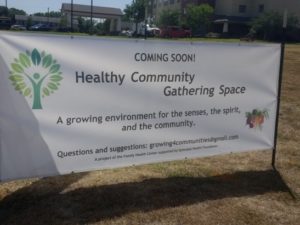 FHC has made property available for the development of a health-promoting Community Gathering Space. Located next to FHC’s main site on Colcord between 15th and 18th, and guided by the expertise of Dr. Aime Sommerfeld-Lillard, this park-like garden space will offer clinic staff and neighbors a place to nurture their physical, mental, and social well-being.
FHC has made property available for the development of a health-promoting Community Gathering Space. Located next to FHC’s main site on Colcord between 15th and 18th, and guided by the expertise of Dr. Aime Sommerfeld-Lillard, this park-like garden space will offer clinic staff and neighbors a place to nurture their physical, mental, and social well-being.
FHC physicians serve on working groups of the Prosper Waco initiative. As part of a “Health in All Policies” approach, FHC physicians and staff are collaborating with other community members to embed health considerations into decision making on a broad range of efforts influencing health.
You’ve read this far, so you must be interested in moving our community from “sick care” toward a more holistic, efficient healthcare system, too! If so, there are several ways in which you can be involved:
- Contact FHC’s Development Director, Carlos Hinojosa, to contribute financially to any of the projects
- Get in touch with Rachel Ledbetter, FHC’s Volunteer Program Coordinator, to learn about ways to volunteer your time and expertise
If you want to learn more about any of the initiatives, see the links below:
Find out more about World Hunger Relief, Inc, Medical-Legal Partnerships, Greater Waco Legal Services, and Health in All Policies.
Watch these videos for more on Community Centered Health Homes and FHC’s produce and exercise prescriptions.
And for a real treat, enjoy Letitia’s story about her experience at FHC.
 After nearly 20 years as an educator, Wendy Cox returned to school and earned a master’s degree in Public Health from Baylor University. She is currently the Community Centered Health Home (CCHH) manager at Family Health Center and spends her days working with clinic staff and community partners to facilitate their work in making our community a healthier place to live. In her spare time, you’ll likely find her walking Waco’s extensive river trails, reading a novel, or watching a movie with her family.
After nearly 20 years as an educator, Wendy Cox returned to school and earned a master’s degree in Public Health from Baylor University. She is currently the Community Centered Health Home (CCHH) manager at Family Health Center and spends her days working with clinic staff and community partners to facilitate their work in making our community a healthier place to live. In her spare time, you’ll likely find her walking Waco’s extensive river trails, reading a novel, or watching a movie with her family.
The Act Locally Waco blog publishes posts with a connection to these aspirations for Waco. If you are interested in writing for the Act Locally Waco Blog, please email [email protected] for more information.
By Jamie Schmitt
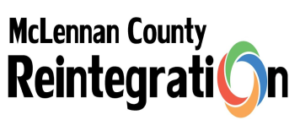 Everybody knows someone who has been affected by incarceration. The goal of the McLennan County Reintegration Program is to make sure that individuals who have current or previous justice involvement are allowed to become the person they were truly meant to be! The McLennan County Reintegration Program is a collaborative effort between the City of Waco and McLennan County in partnership with Heart of Texas Region MHMR. It provides transitional services to those currently in the county jail and those just released. The assistance may start while the client is in jail, and often continues post release. Services focus on helping individuals successfully reintegrate into the community and avoid re-incarceration. Services include employment readiness, job search, locating housing, mental health counseling, addiction counseling, and various other support services.
Everybody knows someone who has been affected by incarceration. The goal of the McLennan County Reintegration Program is to make sure that individuals who have current or previous justice involvement are allowed to become the person they were truly meant to be! The McLennan County Reintegration Program is a collaborative effort between the City of Waco and McLennan County in partnership with Heart of Texas Region MHMR. It provides transitional services to those currently in the county jail and those just released. The assistance may start while the client is in jail, and often continues post release. Services focus on helping individuals successfully reintegrate into the community and avoid re-incarceration. Services include employment readiness, job search, locating housing, mental health counseling, addiction counseling, and various other support services.
Successful reintegration begins while individuals are still incarcerated. By participating in the program while incarcerated, participants receive individual and group clinical services designed to holistically support the recovery process and achieve the self-sufficiency required to sustain a productive lifestyle free from involvement of illegal activities.
The Program has two phases: one while individuals are still incarcerated and another phase after the individuals are released. During our jail-based portion of the program, which begins in the McLennan County jail, individuals participate in an assessment, group and individual counseling along with pre-release planning to prepare for a stable reentry into the community. Upon release, the program continues to work with the individuals to help prevent recidivism. The program offers weekly groups and individual counseling sessions as the individuals attempt to re-establish and maintain their role as a family member, employee, student, parent, and community member.
Mentorship is an important part of successful reentry and studies show that it helps to prevent recidivism. The program has wonderful community partners who dedicate their time speaking with our clients in the McLennan County jail. Our volunteers include Alcoholics Anonymous, Winner’s Circle and Narcotics Anonymous group members. Having these motivational speakers is an important part of the recovery process which builds positive relationships while in early recovery. The relationships built continue to support clients well into the long-term recovery journey.
Click on the following links to read success stories of the Reintegration Program:
- http://www.kwtx.com/content/news/An-Inmates-Second-Chance-McLennan-County-Jail-Pilots-Reintegration-Program-409602635.html
- https://www.wacotrib.com/news/mclennan_county/music-behind-bars-helping-inmates-prepare-for-freedom/article_c803c8ce-2bce-5921-9d2f-f7c13f5ec1ce.html
- http://www.kwtx.com/content/news/Local-jails-reintegration-program-proves-successful-for-inmates-expansion-in-the-works-436436873.html
If you would like more information please contact Jamie Schmitt by phone or email 254-297-7706, [email protected].
 Jamie Schmitt, MSW, LCDC, PRSS-TOC has been counseling in the recovery field since 2003. With a passion to provide a true Recovery Oriented Systems of Care for all individuals and their supports, she co-founded Heart of Heart of Texas Region ROSC in 2011. In 2017, Jamie was honored to receive the D. Frank Davis Professional and Community Outreach Award which is presented to individuals who have a demonstrated tenured dedication to the addiction profession while actively supporting the mission of recovery through their involvement in other key organizations. #RecoveryHappens
Jamie Schmitt, MSW, LCDC, PRSS-TOC has been counseling in the recovery field since 2003. With a passion to provide a true Recovery Oriented Systems of Care for all individuals and their supports, she co-founded Heart of Heart of Texas Region ROSC in 2011. In 2017, Jamie was honored to receive the D. Frank Davis Professional and Community Outreach Award which is presented to individuals who have a demonstrated tenured dedication to the addiction profession while actively supporting the mission of recovery through their involvement in other key organizations. #RecoveryHappens
The Act Locally Waco blog publishes posts with a connection to these aspirations for Waco. If you are interested in writing for the Act Locally Waco Blog, please email [email protected] for more information.
By Christina Helmick
In 2014, the City of Waco commissioned a study to identify innovative economic development strategies that could concurrently enhance the local economic base and provide a sustainable pathway for economically-disadvantaged Waco residents toward full-time employment. That study, called the Upjohn Economic Development Study, provided City officials with 80 pages of potential evidence-based strategies to improve Waco’s economic development efforts, which would also enhance efforts to decrease Waco’s poverty rate.
One of the strategies identified in the 2014 Upjohn Economic Study was the need for an employer resource network. The concept of the employer resource network is to connect the needs of local employers to social service agencies supporting individuals looking for jobs or needing assistance in keeping the jobs. To those who know her, it is no surprise that Ashley Bean Thornton took the lead and created the first phase of Waco’s employer resource network, called WFEN (Waco Foundational Employment Network) at the time. For about a year and a half, local employers, social service agencies and staffing agencies met to discuss how each entity can work together to keep individuals in jobs.
 Combined with the findings of the Upjohn study and the success of WFEN, the City of Waco provided pilot funding to Caritas of Waco and Heart of Texas Goodwill to be the lead implementing partners of the Waco Employer Resource Network (WERN) in late 2017. WERN’s mission is to provide holistic, personalized support to local employers and employees, ensuring a strong, sustainable workforce for today and for the future.
Combined with the findings of the Upjohn study and the success of WFEN, the City of Waco provided pilot funding to Caritas of Waco and Heart of Texas Goodwill to be the lead implementing partners of the Waco Employer Resource Network (WERN) in late 2017. WERN’s mission is to provide holistic, personalized support to local employers and employees, ensuring a strong, sustainable workforce for today and for the future.
The Network is led by a Success Coach, Spike Burt, and Liaison, Katy Schulz. The Network provides:
- Confidential, personalized one-on-one case management for an individual employee facing challenges
- Connection to local support services that are beyond the employer’s scope of work.
The hope is that this holistic support will result in Increased employee retention and productivity. The collaborative efforts of organizations involved in WERN are working to improve Waco’s median household income. Right now, the median household income in Waco is $37,722.
Spike Burt, the Network’s Success Coach, supports, assists and encourages each employee to overcome barriers to retaining employment. He connects employees to company, public and nonprofit resources such as:
- Childcare
- Transportation
- Housing
- Education (GED, ESL)
- Utility assistance
- Job training
The Network’s Liaison, Katy Schulz, is the central point of contact for employers. She works with organizations involved in WERN, sends out career opportunities to the Network, and coordinates the monthly Network meeting. The monthly Network meetings are focused on bridging the gap between local employers and local resources to support employees.
If you would like to join WERN (as an employer or partner agency), please email Katy Schulz at [email protected]. You can follow WERN on Facebook to keep up-to-date of the Network’s activities!
 If you’d like to learn more about WERN and other efforts addressing quality of life in Waco, visit The Work page on the Prosper Waco website!
If you’d like to learn more about WERN and other efforts addressing quality of life in Waco, visit The Work page on the Prosper Waco website!
 Christina Helmick is the director of communication at Prosper Waco. She is a recent graduate of Baylor University with a BA in Journalism, Public Relations & New Media. Originally she is from Washington, D.C., but has stayed in Waco post-graduation. She is an active mentor at J.H. Hines Elementary School, enjoys spending time with her family and watching Baylor football. Sic ’em Bears!
Christina Helmick is the director of communication at Prosper Waco. She is a recent graduate of Baylor University with a BA in Journalism, Public Relations & New Media. Originally she is from Washington, D.C., but has stayed in Waco post-graduation. She is an active mentor at J.H. Hines Elementary School, enjoys spending time with her family and watching Baylor football. Sic ’em Bears!
The Act Locally Waco blog publishes posts with a connection to these aspirations for Waco. If you are interested in writing for the Act Locally Waco Blog, please email [email protected] for more information.
By Christina Helmick
Do you live in one of the following zip codes: 76704, 76705, 76706 or 76707? Did you know that you have a certified Community Health Worker who is dedicated to helping you navigate the healthcare system and focused on connecting you to local resources? Did we mention it is all for free?
The McLennan County Community Health Worker Initiative, referred to as CHW, is a program led by the Waco-McLennan County Public Health District to connect individuals in Waco’s most high-need areas to healthcare information and resources. This program was made possible through generous funding by Episcopal Health Foundation and is in partnership with Providence Healthcare Network, Baylor Scott & White-Hillcrest and Family Health Center. There are three CHWs per high-need zip code, which totals 12 CHWs for Waco!
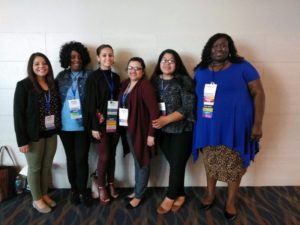
Pictured above are a group of Waco’s Community Health Workers.
Since CHWs are individuals who are from, work in and understand the community they represent, I thought I would take the opportunity to do a Q&A with two CHWs so people can get to know who they are and how to get in touch with them! The Q&A features Domonique Corsey, a CHW for the East Waco community, and Christy Perkins, a CHW for the North Waco community!
Q: Why do you think the CHW initiative is important for our community?
Domonique: The CHW initiative is good for the Waco community because as community members, we have the opportunity to be the voice for the voiceless. The Waco community needs to see that they have people who are there for them through every circumstance. We as Community Health Workers advocate, manage, facilitate, encourage, educate and build—just to name a few! Our tasks vary from distributing brochures with educational information in relevant neighborhoods to helping an elderly woman check her glucose levels. CHWs also work with individuals or groups to educate them on preventable diseases like diabetes or heart disease.
Christy: The CHW program is important to our community for many reasons. This program supplies Waco’s most high-need communities with CHWs who will advocate on behalf of clients’ overall needs with true intent to produce a positive change. One of the most important roles of a Community Health Worker is to build trusting relationships with their clients. One way we are able to do that is by meeting them in a comfortable setting. By meeting people where they are in life and without judgment, it gives clients someone who they can trust and discuss issues with. CHWs help to set and reach goals according to their individual needs. The CHWs help to access resources while educating clients on how to navigate resources self-sufficiently.
Q: Why did you apply to become a Community Health Worker?
Domonique: Once I heard of the CHW initiative, I knew it was for me because of my passion for the community. I am passionate about being a helping hand and seeing others succeed. To me it’s very important to be able to help others thrive. I love learning while I work and I truly enjoy what I do as a CHW—who doesn’t want that!
Christy: I applied to become a CHW because I have a passion for advocacy. I have a desire to raise awareness for advocacy and resources available to people. I didn’t know where to start and this opportunity gave me access to step into that role. I have a heart for people and want to assist them in pushing past adversity and living their best lives.
Q: Since you started working at a Community Health Worker, what have you seen as the biggest health-related needs in your community?
Domonique: In East Waco, the biggest needs range from employment, affordable housing, and various healthcare needs, especially mental health. When you drive around East Waco, you see so many people walking around ill and homeless. Another need I see is the connection with our youth. Our community needs low-cost or free programs that can enrich our young people’s lives. I also see many exterior structures that need repair, such as stop signs and sidewalks.
Christy: In North Waco, one of the greatest needs is providing resources to the homeless. There is overpopulation in the shelters in our community. Many of our homeless population have health issues and most often mental health issues. They are subject to harsh weather and struggle to provide the necessities to live day-to-day. The needs are many and the access to them is limited for a number of reasons. Other needs I see are childcare and rental assistance! Some barriers to resources in the North Waco community are simply the lack of knowledge of the available resources available and language.
If you are looking to get connected to your Community Health Worker, you can call the CHW coordinator, Paula Solano, at the Health District! Her phone number is 254-750-5631. She will pair you with your Community Health Worker.
The Waco-McLennan County Public Health District is looking for THREE more CHWs for the 76705, 76706 and 76707 community! Ideally, the CHWs would be bilingual and/or male. If you know of someone who would make a great CHW, call Paula Solano (254-750-5631).
Collaborative efforts like the CHW initiative are working to address the community’s goals around access to care, including increasing the percentage of individuals who have health insurance and decreasing the use of the emergency room as a source of primary care. To learn more about initiative efforts like the CHW, visit the Prosper Waco website.
 Christina Helmick is the director of communication at Prosper Waco. She is a recent graduate of Baylor University with a BA in Journalism, Public Relations & New Media. Originally she is from Washington, D.C., but has stayed in Waco post-graduation. She is an active mentor at J.H. Hines Elementary School, enjoys spending time with her family and watching Baylor football. Sic ’em Bears!
Christina Helmick is the director of communication at Prosper Waco. She is a recent graduate of Baylor University with a BA in Journalism, Public Relations & New Media. Originally she is from Washington, D.C., but has stayed in Waco post-graduation. She is an active mentor at J.H. Hines Elementary School, enjoys spending time with her family and watching Baylor football. Sic ’em Bears!
The Act Locally Waco blog publishes posts with a connection to these aspirations for Waco. If you are interested in writing for the Act Locally Waco Blog, please email [email protected] for more information.
By Kelli McAdams
Our Community Our Future (OCOF) was started in the Fall 2015, when Klaras Center for Families (KCF), the child and adolescent division of Heart of Texas Region MHMR, helped to organize a committee of community stakeholders to look at the needs of children and adolescents in our community.
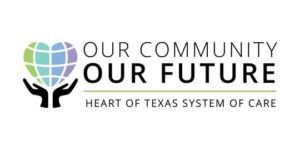 Our initial goal for OCOF was to identify gaps in services and to work with community partners to meet those identified needs. In an effort to help meet some of the needs identified, we at KCF applied for grant funding on behalf of the OCOF committee. We were awarded the grant and received $3.4 million for an initiative called “Closing the Gaps” through the Substance Abuse and Mental Health Services Administration (SAMHSA). The mission of Closing the Gaps is, “to provide access to previously inaccessible services and supports for our community’s most at-risk youth in order to enhance opportunities and improve outcomes for future success.”
Our initial goal for OCOF was to identify gaps in services and to work with community partners to meet those identified needs. In an effort to help meet some of the needs identified, we at KCF applied for grant funding on behalf of the OCOF committee. We were awarded the grant and received $3.4 million for an initiative called “Closing the Gaps” through the Substance Abuse and Mental Health Services Administration (SAMHSA). The mission of Closing the Gaps is, “to provide access to previously inaccessible services and supports for our community’s most at-risk youth in order to enhance opportunities and improve outcomes for future success.”
There are three main targets for the funding of this four-year grant:
- School Based Mental Health
- Transition Age Youth (TAY)
- Crisis Respite for Youth
Here are some examples of how we are using the grant funds…
School Based Mental Health – Through OCOF, we have been able to place counselors and case managers on location at schools in the area. This makes it possible to provide the children and adolescents with the most intensive mental health needs with the care they need with minimal disruption to their school day. Quick and easy access to a counselor or case manager during times of crisis allows for immediate collaboration with school staff to best meet the student’s needs. We are currently on 25 campuses and are serving at least 125 students.
Transition Age Youth – Transition Age Youth (TAY) are individuals ages of 18 to 22. Our grant allows us to provide people in this age range with mental health services and additional support for life skills, education, and employment. Currently we are serving around 30 individuals.
Crisis Respite for Youth – Crisis Respite is a service that is much needed in our community. This means providing a temporary place to stay for young people who need something other than a juvenile placement, CPS placement, or psychiatric hospitalization. For example, Crisis Respite is needed for …
- children in mental health crisis
- homeless youth in crisis
- victims of human trafficking
- CPS youth in need of respite
- other similar situations.
Klaras Center for Families is currently in the process of finding a facility that will serve as the Crisis Respite. It is our plan to have our facility function much like a residential home environment instead of a sterile hospital-like setting.
What are we doing in the future? OCOF’s future plans include expanding our community partners, adding additional school partners, applying for grants to expand our TAY program, and opening our Crisis Respite Facility in 2018. Above all, we want to continue filling gaps in services for children, adolescents, youth, and young adults in our community.
 Kelli McAdams works for the Heart of Texas Region MHMR, as a Licensed Clinical Social Worker. She has been with the child and adolescent division of MHMR, Klaras Center for Families, for the last 10 years, most recently as Child and Adolescent Crisis Respite Program Director. As part of Our Community Our Future, I am the Social Marketing Lead, and have the pleasure of sharing what the local system of care is doing to fill the gaps in services, in our community. For more information about collaborative efforts like “Our Community, Our Future” in the Waco community, please visit the Prosper Waco website – www.prosperwaco.org.
Kelli McAdams works for the Heart of Texas Region MHMR, as a Licensed Clinical Social Worker. She has been with the child and adolescent division of MHMR, Klaras Center for Families, for the last 10 years, most recently as Child and Adolescent Crisis Respite Program Director. As part of Our Community Our Future, I am the Social Marketing Lead, and have the pleasure of sharing what the local system of care is doing to fill the gaps in services, in our community. For more information about collaborative efforts like “Our Community, Our Future” in the Waco community, please visit the Prosper Waco website – www.prosperwaco.org.
he Act Locally Waco blog publishes posts with a connection to these aspirations for Waco. If you are interested in writing for the Act Locally Waco Blog, please email [email protected] for more information.
By Christina Helmick
April is National Financial Literacy Month! An important aspect of financial literacy is understanding the importance of avoiding high-cost financial services like check cashing or payday loans. Did you know that people who don’t have bank accounts are about six times more likely to use check cashing services than those that do? That is why banks and nonprofits in our community have come together to increase access to banking services by offering Bank On Waco accounts!
The Bank On Waco coalition is a partnership of multiple banks and nonprofit organizations dedicated to increasing access to the mainstream financial system. The Bank On Waco initiative is a national project of the Cities for Financial Empowerment (CFE) Fund with the support of some of the country’s biggest banks. Efforts of the Bank On Waco coalition address the Prosper Waco initiative’s wealth goals, which are to reduce the percentage of households living without three months’ worth of savings and have more than 50% of households with a net worth above $15,000.
 The bank accounts offered in connection to the Bank On initiative are designed to benefit the underbanked community members. Someone who is underbanked is an individual who sometimes or frequently utilizes high-cost financial services like check cashing or payday loans rather than the services of a traditional bank.
The bank accounts offered in connection to the Bank On initiative are designed to benefit the underbanked community members. Someone who is underbanked is an individual who sometimes or frequently utilizes high-cost financial services like check cashing or payday loans rather than the services of a traditional bank.
Anyone can qualify for a Bank On Waco account, and individuals who choose to open an account have access to a range of low-cost financial services! Bank On Waco accounts do not have an income threshold a person must meet, which means the accounts are set up to help ALL residents avoid high-cost financial services and keep more money in their pockets!
Benefits of opening a Bank On Waco account include:
- Low-to-no fee accounts
- No overdraft fees
- Free online bill-pay
- Matricula card accepted
- Free financial literacy
- Free customer service
- Free online banking
- Free paper statements
Banks that offer Bank On account benefits include BBVA Compass, Extraco Banks, Independent Bank and Wells Fargo. Other banks involved in the coalition that offer low-fee accounts include American Bank, Central National Bank, Community Bank & Trust and First National Bank of Central Texas.
Take a step toward financial health and learn more about Bank On Waco by visiting bankonwaco.com .
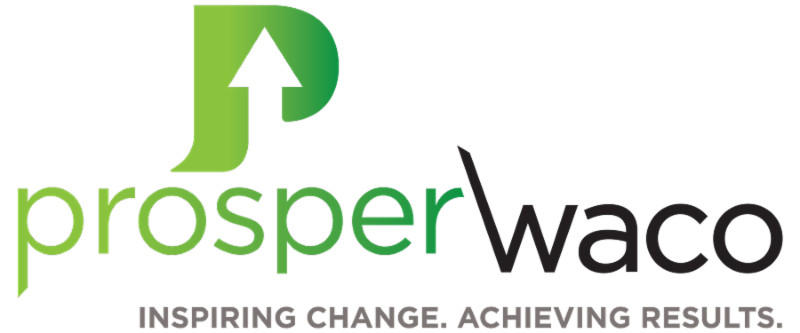 To learn more about initiatives to improve education, health and financial security outcomes in the Waco area, visit www.prosperwaco.org or call 254-741-0081.
To learn more about initiatives to improve education, health and financial security outcomes in the Waco area, visit www.prosperwaco.org or call 254-741-0081.
 Christina Helmick is the director of communication at Prosper Waco. She is a recent graduate of Baylor University with a BA in Journalism, Public Relations & New Media. Originally she is from Washington, D.C., but has stayed in Waco post-graduation. She is an active mentor at J.H. Hines Elementary School, enjoys spending time with her family and watching Baylor football. Sic ’em Bears!
Christina Helmick is the director of communication at Prosper Waco. She is a recent graduate of Baylor University with a BA in Journalism, Public Relations & New Media. Originally she is from Washington, D.C., but has stayed in Waco post-graduation. She is an active mentor at J.H. Hines Elementary School, enjoys spending time with her family and watching Baylor football. Sic ’em Bears!
The Act Locally Waco blog publishes posts with a connection to these aspirations for Waco. If you are interested in writing for the Act Locally Waco Blog, please email [email protected] for more information.
By Christina Helmick
When you think about what it means to make sure students are prepared to enter college successfully, what comes to mind? That they know how to fill out FAFSA and local scholarship opportunities like the MAC grant? That they have been on college tours throughout Texas and the nation? Or, that they have someone helping them figure out their time management skills prior to getting to college? When I think of what it means to make sure students are prepared for the next level, I think of Project Link.
Project Link is a multi-year project funded by the Rapoport Foundation that partners Waco ISD, La Vega ISD, MCC, and TSTC to serve a cohort of more than 1,000 local students and their families in charting a successful post-secondary journey through intense one-on-one college, career, and financial advising. The goal of the program is to ensure that more students have the opportunity to develop personal relationships with professionals who are focused exclusively on the process of supporting them through high school and ensuring a seamless transition to college, where they will receive continued support until completion of their college degree.
In the 2017-2018 Project Link cohort, 1,131 students are being served across all five campuses. Since the program started in the school year 2015-2016, 328 Project Link students have graduated and enrolled in college.
Project Link is staffed by a Project Link Coordinator who manages grant operations on a day-to-day basis and five Project Link Liaisons, three at the high school level and two at the college level. The three high school Liaisons work with Project Link students to prepare them for college in many ways such as:
- helping students with academic planning for college and career readiness
- providing enrichment opportunities
- college and career assessments
- college affordability planning and financial literacy
- college and career application process
The two Liaisons at MCC and TSTC work with Project Link students to help them through:
- one-on-one mentoring and advising
- life coaching
- college transitioning
- transfer requirements
- financial aid and literacy assistance
- scholarship information
- stress management
- student leadership opportunities
“As a Project Link Liaison, I work with many students who don’t think college is a realistic possibility for them. Much of my job is educating students about what college is and how they can benefit from continuing their education after college. In my specific role, I am able to assist students with navigating the college admissions process and financial aid completion and continue supporting them as their personal advisor at TSTC. The most fulfilling moments of my job are when successful students tell me that they would not be in college if not for the hard work of Project Link Liaisons,” Brandon Chappell, a Project Link Liaison, said.
To learn more about Project Link, visit https://prosperwaco.org/work_category/education/ or call 254-741-0081.
 Christina Helmick is the director of communication at Prosper Waco. She is a recent graduate of Baylor University with a BA in Journalism, Public Relations & New Media. Originally she is from Washington, D.C., but has stayed in Waco post-graduation. She is an active mentor at J.H. Hines Elementary School, enjoys spending time with her family and watching Baylor football. Sic ’em Bears!
Christina Helmick is the director of communication at Prosper Waco. She is a recent graduate of Baylor University with a BA in Journalism, Public Relations & New Media. Originally she is from Washington, D.C., but has stayed in Waco post-graduation. She is an active mentor at J.H. Hines Elementary School, enjoys spending time with her family and watching Baylor football. Sic ’em Bears!
The Act Locally Waco blog publishes posts with a connection to these aspirations for Waco. If you are interested in writing for the Act Locally Waco Blog, please email [email protected] for more information.
